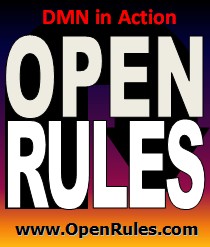Open Your Business Rules!
Rules-based
Operational Decision Services
OpenRules Decision Services
OpenRules was designed to be a "good citizen" of the modern service-oriented world. The following schema represents a typical Service-Oriented Architecture (SOA) with rules-based decision services:

SOA integrates a Business Process Management (BPM) system with a BRMS system such as OpenRules considering its rules-based Decision Services as another type of loosely coupled services. When an event controlled by a rule occurs, BPM engine invokes the associated rules-based service to make application specific decisions. These rule services usually receive clearly specified input/output objects and a reference to the business rule sets to be examined during service execution. At run-time, the rule service executes a rule engine passing to it input/output objects and rule sets from a Business Rules Repository.
OpenRules also fits perfectly a Microservice Architecture when OpenRules is used for developing a single application as a suite of small decision services, each running in its own process and communicating with lightweight mechanisms, often an HTTP resource API. These decision services can be built around business capabilities and independently deployable by fully automated deployment machinery.
Most organizations initially represent their business rules repository using MS Excel and/or MS Word. Then they select a BRMS system that in most cases provides an Excel-like graphical tool for Rules/Decision Management. In contrast to the most commercial systems, OpenRules recommends using Excel itself as the ultimate Management tool for business analysts. Alternatively, you can use OpenOffice or Google Sheets. To make this happen, OpenRules integrate Excel with a set of Open Source tools to support both business and technical people during decision modeling, automation, testing, and integration. For Project management we recommend using a free Open Source Eclipse, the de-facto standard integrated development environment with plug-ins that support business terms, rules, forms, and processes presented in Excel tables.
Along with Rules-based decision services OpenRules also support Constraint-based decision services that utilizes OpenRules Rule Solver.
OpenRules allows you to develop complex Web applications without being an expert in various Web development techniques. Using the commonly known Excel interface, you can define your business logic in a form of Excel-based business rules and make them available as fine-grained Web services. Then, you may define your presentation logic using Excel-based web forms with associated interaction rules. Being deployed as a presentation-oriented Web application, it will invoke the related rule services whenever necessary. Frequently, such a service-oriented approach to web application development also involves a workflow engine that uses a publish/subscribe paradigm for automatic invocation of different web services.

